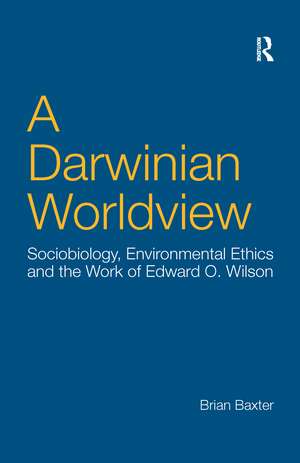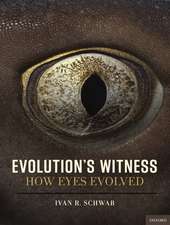A Darwinian Worldview: Sociobiology, Environmental Ethics and the Work of Edward O. Wilson
Autor Brian Baxteren Limba Engleză Paperback – 19 oct 2016
| Toate formatele și edițiile | Preț | Express |
|---|---|---|
| Paperback (1) | 469.34 lei 6-8 săpt. | |
| Taylor & Francis – 19 oct 2016 | 469.34 lei 6-8 săpt. | |
| Hardback (1) | 1054.71 lei 6-8 săpt. | |
| Taylor & Francis – 28 iul 2007 | 1054.71 lei 6-8 săpt. |
Preț: 469.34 lei
Nou
Puncte Express: 704
Preț estimativ în valută:
89.81€ • 93.77$ • 74.33£
89.81€ • 93.77$ • 74.33£
Carte tipărită la comandă
Livrare economică 05-19 aprilie
Preluare comenzi: 021 569.72.76
Specificații
ISBN-13: 9781138259461
ISBN-10: 1138259462
Pagini: 208
Dimensiuni: 156 x 234 x 11 mm
Greutate: 0.45 kg
Ediția:1
Editura: Taylor & Francis
Colecția Routledge
Locul publicării:Oxford, United Kingdom
ISBN-10: 1138259462
Pagini: 208
Dimensiuni: 156 x 234 x 11 mm
Greutate: 0.45 kg
Ediția:1
Editura: Taylor & Francis
Colecția Routledge
Locul publicării:Oxford, United Kingdom
Cuprins
Contents: Introduction. Part 1 The Explanatory Issue: Sociobiology; Evolutionary psychology; Gene-culture co-evolution; Consilience. Part 2 The Moral Issue: Darwinian naturalism, environmentalism and humanism; Naturalism and morality; The possibility of environmental ethics; Evolution, meaning, suffering and death; Conclusion. Appendix; Bibliography; Index.
Notă biografică
Brian Baxter is Senior Lecturer in the Department of Politics, The University of Dundee, Scotland, UK.
Recenzii
'Brian Baxter's A Darwinian Worldview is a major scholarly achievement, which breaks new ground in environmental theory by taking seriously the normative implications of humans not just being like other animals, but being a species of animal. In it he brings the evolutionary insights of Darwin, and later writers in what we can call the 'naturalistic tradition', such as E.O. Wilson, together with major concerns of environmental ethics and human responsibilities towards the non-human world. His synthesis is at once provocative and original; provocative in reminding us that human instincts do matter, (but avoiding the pitfalls of a simplistic socio-biological perspective) and original in providing a naturalistic and evolutionary foundation for human care for the non-human world. Baxter has produced a significant and genuinely interdisciplinary work bridging natural science, social science and ethical investigation, and points the way towards a new research horizon, which others will follow. It is rare to find a work which so patiently and clearly highlights the evolutionarily-grounded ethical nuances of the human condition both as a part of, as well as apart from, the nonhuman world and that convincingly demonstrates why, and how, what unites us with the non-human world is prior to and significant for what differentiates us, but cannot be used to support the long-standing position of some ontological gulf and separation between humanity and the non-human world. Baxter is to be roundly congratulated on producing such a path-breaking piece of scholarship.' John Barry, Queen’s University Belfast, Northern Ireland ’The author examines the concept that the human brain and behavior are products of Darwin’s theory of evolution by natural selection...a rigorous work”directed toward biologists and social scientists”dealing with complex, controversial issues...Recommended.’ Choice
Descriere
Darwin's theory of evolution by natural selection is considered in its application to human beings in this book. Brian Baxter examines the various sociobiological approaches to the explanation of human behaviour which view the human brain, and so the human mind, as the product of evolution, and considers the main arguments for and against this claim. In so doing he defends the approaches against some common criticisms, such as the charge that they are reductionist and dehumanising. The implications of these arguments for the social sciences and humanities are assessed, as is the naturalistic view of ethics to which they lead.











